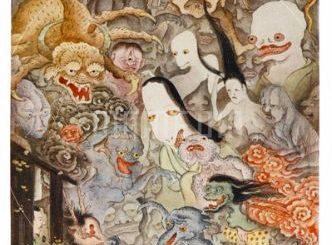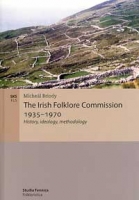Mermaids
Tales of mermaids have been around for centuries, and form a large part of seafaring lore, especially round the coastal areas of Britain such as Cornwall, and the Northern Isles of Scotland. Their sighting was thought to be a bad omen, foretelling storms and rough seas. There are numerous folk tales describing their interaction with humans.
 The descriptions of mermaids were remarkably similar from the tip of Cornwall, to the Outer Hebrides. Generally their upper body was that of a beautiful woman with long hair, and the lower half of their body from the waist down, was that of a fish. In many of the classic descriptions mermaids are to be found sitting on a rock just off the shore, combing their hair, singing sweetly and admiring their beauty in a hand mirror. Their beautiful singing brings men into their clutches much like the classical sirens, and the unfortunate victims are either drowned, spirited to their world, or eaten in the depths of the sea. Mermaids Rock, near Lamorna on the Eastern tip of Cornwall was one such haunted seat, the mermaid was said sing the local fishermen to their deaths. Sometimes mermaids are compelled from the water by mortal singing. The Mermaid of Zennor in Cornwall claimed Mathew Trewella as her prize because of his singing voice.
The descriptions of mermaids were remarkably similar from the tip of Cornwall, to the Outer Hebrides. Generally their upper body was that of a beautiful woman with long hair, and the lower half of their body from the waist down, was that of a fish. In many of the classic descriptions mermaids are to be found sitting on a rock just off the shore, combing their hair, singing sweetly and admiring their beauty in a hand mirror. Their beautiful singing brings men into their clutches much like the classical sirens, and the unfortunate victims are either drowned, spirited to their world, or eaten in the depths of the sea. Mermaids Rock, near Lamorna on the Eastern tip of Cornwall was one such haunted seat, the mermaid was said sing the local fishermen to their deaths. Sometimes mermaids are compelled from the water by mortal singing. The Mermaid of Zennor in Cornwall claimed Mathew Trewella as her prize because of his singing voice.
In some tales mermaids are more benevolent, and have the ability to grant the gift of magical powers, but usually there is a still high price to pay. In the story of Lutey and the Mermaid (Bottrell, The traditional and Hearthside stories of West Cornwall) Lutey, a Cornish fisherman finds a stranded mermaid on the shore while he is beach combing. He helps her back to the sea and she offers him three wishes. He chooses the power to break spells, the power to compel spirits for the good of others, and that these gifts would pass down the family line. She grants the wishes but almost pulls him into the sea; only by flashing a penknife before her (supernatural creatures are traditionally repelled by Iron) does she release her hold. After nine years of using his gifts the mermaid returns for him and he is compelled to the deep. Thereafter every nine years one of his descendants was said to be lost at sea.
As well as granting wishes there are tales of mermaids intermarrying with humans and creating hybrid children with some powers of faery. An old story attached to Ardrossan Castle in Ayrshire recounts how a sailor was shipwrecked just off the coast and found shelter with a mermaid in a sea cave. They became lovers and their son, by name of Michael Scott went to live in the castle. He owned a magical book inherited from his mother that gave him some magical powers. Whether he is to be identified with the famous wizard Michael Scott is unclear.
Although most tales describe sea dwelling mermaids they were not restricted to the sea, and there are several examples of mermaids haunting rivers and deep pools. Mermaids Pool below Kinder Downfall in Derbyshire is one such location . The mermaid there appears on a specific date and has a typically treacherous nature. Black Mere, near Leek in Staffordshire was also thought to be haunted by a mermaid. It is possible that the term mermaid was used to describe a wider range of supernatural water creatures.
Historically there has been belief in part fish and part human creatures for thousands of years. The first references to these creatures is in the form of the God Oannes, who was the lord of the waters worshiped at the beginning of civilisation in ancient Babylon. There are several other fishtailed gods, but the classic mermaid known in Britain, is more likely derived from Celtic legend, folklore and local sea lore, in places where people were in contact with the sea as part of everyday life.
There have been several actual recorded sightings of mermaids over the last few hundred years, even into the 20th century, especially in places where the old beliefs die hard. In the North of Scotland Sandwood Bay was long thought to be haunted by Mermaids, reported as recently as the 19th century, today the area has a reputation for being haunted by other phenomena, perhaps related in a way to the older sightings. Although these sightings strain credulity they may be related to the same mechanisms that causes people to see ghosts, black dogs etc.




Re: Mermaids
In Elizabethan times, mermaids came to be a euphemism for prostitutes and Mary Queen of Scots was for a time portrayed as a mermaid.